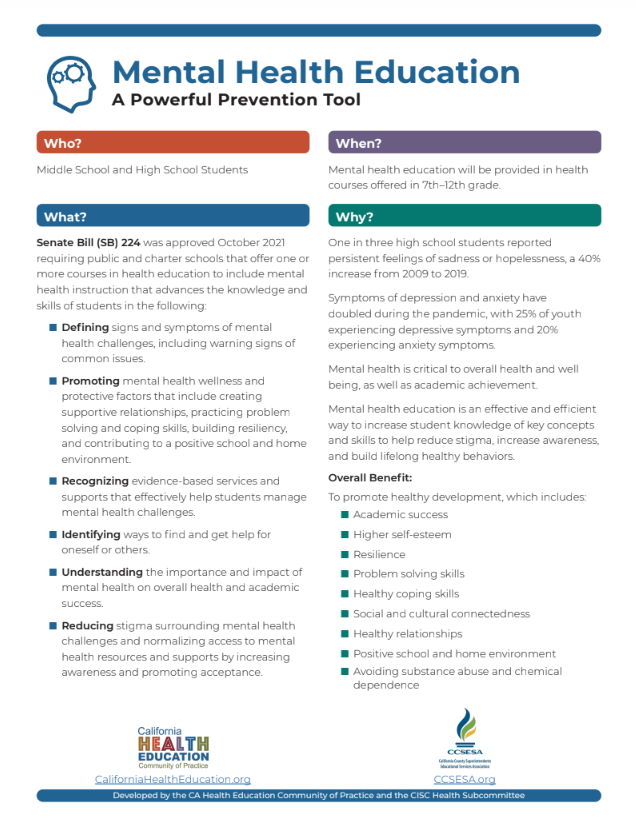“It is inarguable that we are in the midst of a mental health crisis in California. Even before the pandemic, the rate of students struggling with mental health problems such as depression has steadily risen over the years. Now isolated from their family and friends, students are suffering even more. Mental health is just as important as physical health and it is unfortunate that we neglect it in our curriculum. By educating kids from a young age, we can bring these issues out of the shadows and end the stigma and taboo surrounding the discussion of mental health.”
-Senator Anthony Portantino

Youth mental health crisis has intensified as a result of the COVID-19 pandemic. The American Academy of Pediatrics (APA) declared a national emergency in child and adolescent mental health, noting that “emotional and behavioral health challenges were of growing concern before the COVID-19 pandemic, and the public health emergency has only exacerbated these challenges.” Additionally, in December 2021, U.S. Surgeon General Dr. Vivek Murthy issued a public health advisory highlighting the urgent need to address the nation’s youth mental health crisis, calling our obligation not just medical, but moral.
In addition to traditional medical model interventions, increasing mental health literacy among students is critical to building knowledge and skills that protect their health and support them in developing lifelong health enhancing behaviors.
Mental health education is one of the best ways to increase awareness and encourage self-help seeking behavior, while simultaneously reducing the stigma associated with mental health challenges. Since middle and high school students spend more hours at school than at home, the California public education system is the most efficient and effective setting for providing this education to all youth. Schools are, indeed, ideally positioned to provide not only mental health support, but also education.
Mandated Mental Health Education: Senate Bill (SB) 224 was signed into law October 2021 and serves as a significant component of addressing the mental health needs of K-12 students. Education Code 51925 specifies that each school district, county office of education, state special school, and charter school that offers one or more courses in health education to pupils in middle school or high school shall include in those courses instruction in mental health that meets the following requirements:
- Well-designed instruction on the overarching themes and core principles of mental health
- Signs and symptoms of common mental health challenges
- Evidence-based mental health services and supports
- Promotion of protective factors
- Recognition of warning signs to promote awareness and early intervention, and avoid a crisis, including:
- Seeking assistance from school-based mental health professionals and services
- Evidence-based, culturally responsive practices
- Connection to overall health and academic success and co-occurring conditions
- Mental health challenges across populations, cultures, ethnicities, socioeconomic status, etc.
- Addressing mental health stigma, including peer to peer and lived experience
For a summary of how the new mandated mental health education instruction fits into California Health Education courses, download this infographic: CA Health Education and SB 224 Infographic
CA Health Education and SB 224 Infographic
Check out this one pager summarizing SB 224 to create awareness of the mental health education requirements and share with administrators, teachers, educators, counselors, mental health professionals, parents/guardians, and others in your school community.

Mental Health Education Instructional Materials Assessment Tools: To help educators assess curriculum, supplemental materials, and other instructional materials used for the purpose of teaching mental health education to middle or high school students, check out the following tools that include a list of all the SB 224 Education Code requirements districts and schools must ensure is included in their instruction.
Grade 7-8: Mental Health Education Instructional Materials Assessment Tool
Grade 9-12: Mental Health Education Instructional Materials Assessment Tool
Mental Health Resources (CDE): This Mental Health Resource page provides strategies, resources, and training in psychological and mental health issues, including coping with tragedy, crisis intervention and prevention, school psychology and suicide prevention.
WEL Lab (Wellness Education Lab): Practical and empowering mental health training. Each module offers three different versions for three unique audiences: students (13+), parents/guardians, and educators/school staff. Parents/guardians modules are also available in Spanish. Additional Resources for Educators.
Model Mental Health Posters
Model mental health posters, developed in response to Assembly Bill 748. This bill requires each school site in California serving pupils in grades 6 to 12 to create a poster that identifies approaches and shares resources regarding pupil mental health. The poster must be prominently and conspicuously displayed in appropriate public areas that are accessible to, and commonly frequented by, pupils at each local educational agency (LEA) school site. Developed by California Department of Education in collaboration with San Diego County Office of Education and their statewide youth group.
